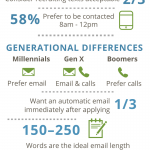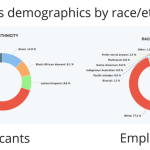Why Your Company Needs To Stop Recruiting “Digital Natives”
Companies that advertise job openings for “digital natives” may think they’re simply appealing to the most tech-adept candidates out there. But they aren’t. When an older worker—even someone in their late thirties—spots that term in a job listing, they’re likely to think applying is a waste of time. This is a loss for organizations.
Even unintentionally, recruiting for “digital natives” represents a form of bias, often called ageism. The descriptor wasn’t meant to be discriminatory, of course, or even to indicate a particular technological prowess. Marc Prensky, who coined “digital natives” and “digital immigrants” in 2001, has even clarified that the “Digital Natives/Digital Immigrants metaphor is NOT about what people know, or can do, with technology. Everyone has to learn in one way or another. It’s more about culture and attitudes.”
Yet when Fortune ran a quick survey of the leading job sites in 2015, the term “digital native” turned up everywhere from Zipcar and CBS TV affiliate to Wunderman (part of Young & Rubicam Brands) and StratusLIVE, which posted forthrightly, “ideal candidate must be a digital native.”
Is “Digital Native” Always Ageist?
Is it ever okay to use “digital native” in a job posting? If a company was looking for an entry-level employee with a strong knowledge base in, say, online media, wouldn’t this term be appropriate?
Not according to Robert Wendover, the award-winning author of 11 books, including Smart Hiring and Crossing the Generational Divide, who says that “digital natives” is itself a “misnomer” that wrongly suggests “that they have a deep knowledge of digital technology”:
Some do, of course, but most are just better at using popular consumer apps than most digital immigrants. I would advise the employer to identify the specific online-media expertise it seeks. Then check out applicants online to see if the skills they claim are demonstrated through their social presence or the work they have produced for others.
In other words, recruiters need to do what they’ve always done, and search for the kinds of qualifications they need, not profile for a type of candidate they imagine to possess them.
Bruce Tracey, professor of management at Cornell University’s School of Hotel Administration, agrees that employers have to be clearer about what they’re looking for. “If a firm is looking to hire someone with proficiency in the development and use of online media,” he says, “then they should simply say so.”
How The Wrong Terminology Can Burn You
But that often doesn’t happen. “Unfortunately, some firms are trying too hard to be relevant to Gen Y, and this type of effort can certainly get them into trouble.”
Ben Gotkin, principal consultant and trainer with Recruiting Toolbox, points out that “a company may use the term ‘digital native’ with the best intentions in a totally benign way, but if the candidate felt that such language was discriminatory, they could make an issue of it, and then the burden of proof would be on the employer to prove that their hiring practices were indeed not discriminatory.” That’s never a position a company wants to find itself in.
Yet from a legal perspective, Tracey disagrees. “As long as the company can demonstrate that each of the indices of the ‘digital native’ construct are valid (i.e. statistically significant) predictors of one or more indicators of job performance,” he argues, “then they can use whatever term they want.”
Still, why not err on the side of caution? After all, avoiding legal action isn’t the only reason to retire “digital native” from the hiring process. Employers should probe their motivations for using it. “It’s not that it’s an inappropriate term” in itself, Gotkin adds, “it’s just that it’s a cliché—trying to sound cool and hip without saying what you really need.”
Companies make the mistake of imagining that it will pay off, but it’s more likely that the most qualified potential candidates—no matter their age—will appreciate clear language detailing what’s expected for the position.
A Matter Of Culture
Culture is a key factor here; the tendency to search for “digital natives” isn’t just a quirk of recruiters. It reflects the way many organizations see themselves overall—proof of which often appears explicitly in job listings. Take these for instance, found easily in quick searches of Indeed.com and Monster.com:
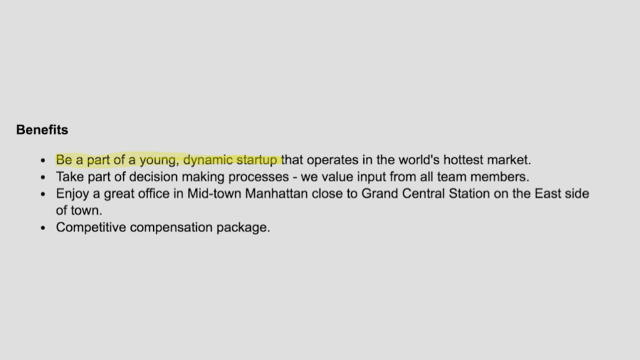
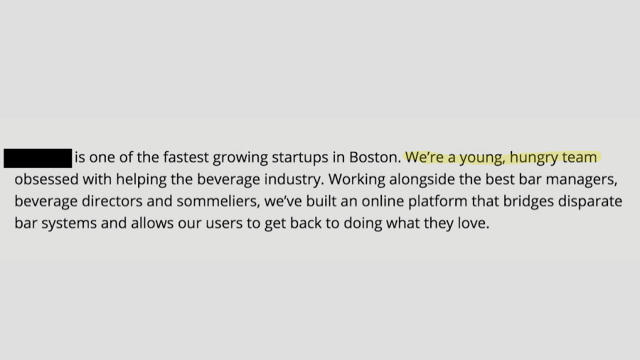
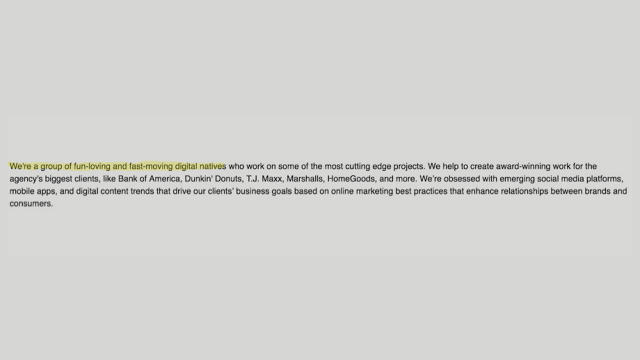
Those descriptions make it clear that older workers aren’t a good fit for that particular company culture. Yet dissuading older talent from applying to an organization simply isn’t good business. Decades of industry experience and wisdom are extremely valuable to any organization, no matter how cutting edge or tech-focused it imagines itself to be or actually is in practice.
Age Discrimination In Context, And Efforts To Stop It
One in three older workers has either experienced discrimination or seen it happen firsthand since 2008. The Bureau of Labor Statistics reports that in 2014, 22.1% of unemployed adults under age 25 had looked for work for 27 weeks or longer, compared with 44.6% of those 55 and older.
To tackle this unintentional ageism, some companies use programs like Textio, which highlights bias and discriminatory language written in job descriptions and recruiting emails.
There’s also a new Google Chrome extension application called Unbias Me that hides candidate’s names and pictures when looking at their profiles on LinkedIn, Twitter, or Github, and an app called Blendoor that works similarly.
While these tools can certainly help, there’s another dimension to this problem that artificial intelligence can’t solve: corporate values.
Examine Your Values Before You Hire
Which brings us back to culture. Your company’s culture should be deeper rooted than just an attitude or vibe—it needs to emerge from values you’ve actually thought about deliberately and decided to embrace.
Before you draft your next job listing, ask yourself: Are your company’s values clearly defined, or are they just a vague sense of how you’d like to be perceived? “Young” is not a value. Maybe if a company seeking a “digital native” looks a little closer, it’ll find that one thing it values is a willingness to be a constant learner and to try new things. Some organizations use “digital native” as a shorthand for that idea, thinking (wrongly) that they go hand-in-hand.
To be sure, technical qualifications aren’t the only thing companies hire for—culture fit matters, too. But generational factors won’t tell you much about either one. So instead, get back to basics: What specific skills are needed to be successful in the role you want to fill? What concrete organizational values do you prize? Define those first, and it’ll actually become a lot easier to integrate them into the talent life cycle than to use a generic, and ultimately discriminatory, shorthand—starting with job postings.
After all, hiring is a serious business, and bad hires can cost you big. The Society for Human Resource Management reports that turnover costs are estimated to range anywhere from 100% to 300% of a replaced employee’s base salary. That’s a big risk, and no “digital native” can reliably help you mitigate it.
Anne Loehr is a sought-after keynote speaker, writer, consultant, and trainer. She helps leaders in large organizations connect their everyday decisions today to the workplace of tomorrow. To learn more, go to www.anneloehr.com and follow her on Twitter at @anneloehr.
Fast Company , Read Full Story
(24)







